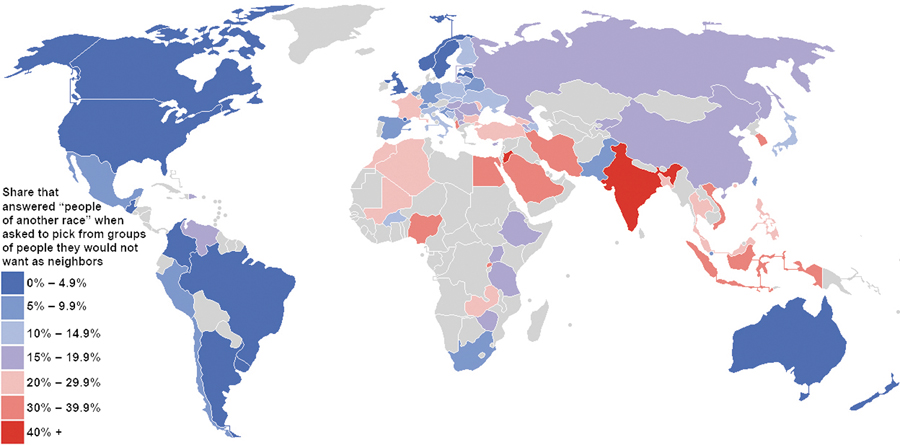A recent study based on World Values Survey places India and Jordan in the most racially intolerant countries. According to Max Fisher, who based his results on the World Values Survey, the conclusion have been reached on the basis of responses from people in 81 of these countries who were asked to identify the people they would not like to be their neighbor. In only two of 81 surveyed countries, i.e., India and Jordan, more than 40% people said they would not like racially different people to be their neighbours. Precisely 43.5% Indians and 51.4% Jordanians said they would not want people who were racially different to be their neighbours.
Although turbulent Pakistan has been projected to be haven for racial hatred in the wake of sectarian violence, only 6.5% Pakistanis objected to a neighbor of a different race. The study says, this would appear to suggest that Pakistanis are more racially tolerant than even Germans or the Dutch.
u Most Tolerant: People in the survey who were found most likely to embrace a racially diverse neighbour were from the United Kingdom and its Anglo former colonies (the United States, Canada, Australia and New Zealand) and in Latin America. The only real exceptions were oil-rich Venezuela, where income inequality sometimes breaks along racial lines, and the Dominican Republic, perhaps because of its adjacency to troubled Haiti. Scandinavian countries also scored high.
u Europe: Immigration and national identity are big, touchy issues in much of Europe, where racial make-ups are changing. Though you might expect the richer, better-educated Western European nations to be more tolerant than those in Eastern Europe, that’s not exactly the case. France appeared to be one of the least racially tolerant countries on the continent, with 22.7% saying they didn’t want a neighbour of another race. Former Soviet states such as Belarus and Latvia scored as more tolerant than much of Europe. Many in the Balkans, perhaps after years of ethnicity-tinged wars, expressed lower racial tolerance.
u Saudi Arabia, Egypt, Iran, Indonesia and Nigeria were the countries where 30 to 39.9% respondents disapproved of racially different people to be their neighbours. The study guesses that immigration is a big issue in this region, particularly in Egypt and Saudi Arabia, which often absorb economic migrants from poorer neighbors.
u Nations such as Indonesia and the Philippines, where many racial groups often jockey for influence and have complicated histories with one another, showed more skepticism of diversity. This was also true, to a lesser extent, in China and Kyrgyzstan. There were similar trends in parts of sub-Saharan Africa.
The World Values Survey is a global research project that explores people’s values and beliefs, how they change over time and what social and political impact they have. It is carried out by a worldwide network of social scientists who, since 1981, have conducted representative national surveys in almost 100 countries. The WVS is the only source of empirical data on attitudes covering a majority of the world’s population (nearly 90%).
(Note: The bluer countries are the least likely to express racist attitudes, while the people in red countries are the most likely.)
AUTHOR: Islamic Voice
Islamic Voice is a monthly Islamic magazine published in Bangalore. It is the largest English language Muslim publication in India. It is a comprehensive magazine, places a relatively high emphasis on social issues and strives to have a broad appeal. Since 1987, Islamic Voice has covered its fascinating namesake without fear or favour, with insight, accuracy, thoroughness and a well rounded perspective on a variety of subjects - be it the economy, politics, lifestyle, the arts, entertainment, travel, science, technology or health. That's why Islamic Voice is the country's most widely read publication, a position it has held for more than a decade. And that's why it makes sense to subscribe to Islamic Voice.
We represents all Muslim sects and shades of thought from all over India. We focus on "our" triumphs which, mostly, go unreported as well as constructively addresses our failures and shortcomings.
Editor-in-Chief: A.W. Sadatullah Khan
Genre: Current Affairs associated with Muslims
Subjects Covered:
Human Rights I Analysis I Special Reports I Issues I Book Reviews I National I International I Newsmakers I Community News I Islamic Perspectives I Classifieds I Opinions
Focus articles on:
Education and Children I Inter-faith Relations I Matrimony I Muslim economy I Muslim Perspective I The Muslim world I Society I Travel I The Western viewpoint I Women in Islam
Special focus on Faith and Law:
Fiqh I Hadith I Quran


COMMENTS